| Srl | Item |
| 1 |
ID:
094124
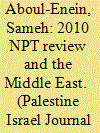

|
|
|
| 2 |
ID:
093563
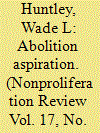

|
|
|
|
|
| Publication |
2010.
|
| Summary/Abstract |
The goal of abolishing all nuclear weapons has often seemed unrealistic, if not utopian. The Cold War posed intractable apocalyptic dangers, and the post-Cold War "peace dividend" proved scant. But over the decades, nuclear arms control and nonproliferation successes have been as important as the setbacks, and in 2010 the abolition aspiration has made something of a comeback. This article surveys the most important challenges facing nuclear disarmament progress today. The article considers the interrelationships among the positions of the key categories of states shaping the contemporary global nuclear order, for good or ill, as a capstone to the other pieces in this special section, which focus on those categories individually. The article concludes that progress toward disarmament will not be easy or fast. Weaning states off their reliance on threats to either use or acquire nuclear arms requires progress in improving the conditions of global governance more generally. But the goal of eliminating the threat of nuclear weapons is a realistic prospect and, consequently, an essential imperative.
|
|
|
|
|
|
|
|
|
|
|
|
|
|
|
|
| 3 |
ID:
152032
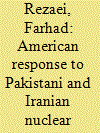

|
|
|
|
|
| Summary/Abstract |
This article explores the paradox in the reaction of the United States to the two different proliferation cases: Pakistan's proliferation and Iran's weaponization effort. The article tries to find answer to the following key question; why the United States, as one of the guardians of the Non-proliferation Treaty (NPT) which would prefer to see a region that is entirely free of weapons of mass destruction, ultimately has accepted Pakistan's proliferation, while imposed considerable amount of pressure to stop Iran from acquiring nuclear weapons.
|
|
|
|
|
|
|
|
|
|
|
|
|
|
|
|
| 4 |
ID:
094154
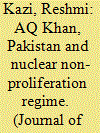

|
|
|
| 5 |
ID:
161340
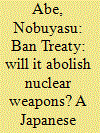

|
|
|
|
|
| Summary/Abstract |
In so far as the nuclear-weapons possessors do not accept the Ban Treaty, practically it will not reduce nuclear weapons nor abolish them as a matter of law. However, if the treaty is accepted by an overwhelming majority of states, it will significantly strengthen the norm against the nuclear weapons. A norm binds everybody irrespective of legal acceptance of a treaty. Thus, it exposes any violator to the risk of international punishment. The Ban Treaty will help bring the movement towards nuclear abolition forward and reduce incentives to own nuclear weapons. The international humanitarian law that was the main basis for the Ban Treaty needs to be upheld firmly. The set of norms under international humanitarian law will serve to limit the justifiable cases where nuclear weapons can ever be used. The Non-Proliferation Treaty and the efforts to prevent nuclear proliferation must be sustained even after the Ban Treaty comes into force.
|
|
|
|
|
|
|
|
|
|
|
|
|
|
|
|
| 6 |
ID:
072169
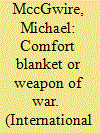

|
|
|
| 7 |
ID:
107091
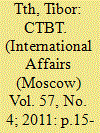

|
|
|
|
|
| Publication |
2011.
|
| Summary/Abstract |
International Affairs: Mr. Tth, the Comprehensive Nuclear-Test-Ban Treaty (CTBT) is one of the main elements of the world's nuclear security. What does your Preparatory Commission expect to accomplish?
Tibor Tth: Practically, compared to the big brothers and big sisters in this building, which houses many other international organizations, we are a teenager, we will be 15 years old as a treaty on 24 September; as an organization, we are 14 years old. We came 40 years later than the IAEA yet we are doing very complimentary things. There is a relationship between what IAEA is supposed to do and what we are supposed to do. IAEA is trying to prevent a potential misuse of technologies, misuse of fissile material and misuse of facilities. If it fails and if countries try out weapons they create as a result of diverting fissile material technologies for military purposes the results will appear on the screen. NPT belongs to the IAEA context; I think that the test ban treaty as an organization is part of a wider NPT regime.
|
|
|
|
|
|
|
|
|
|
|
|
|
|
|
|
| 8 |
ID:
133793
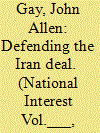

|
|
|
|
|
| Publication |
2014.
|
| Summary/Abstract |
Nuclear talks have yielded a framework that buys time for negotiation and reduces the risk of miscalculation on either side.
IT WAS LONG PAST MIDNIGHT IN GENEVA last November when the rumors began to fly. Iran and the world powers had just reached a deal on its nuclear program. An international crisis that had been building toward what seemed like war for more than a decade was now on the path to resolution. The deal, a haggard John Kerry confirmed, was real. It wasn't comprehensive-Iran would still be heavily sanctioned and heavily centrifuged-but it was unprecedented. All prior efforts had fallen apart.
|
|
|
|
|
|
|
|
|
|
|
|
|
|
|
|
| 9 |
ID:
093562
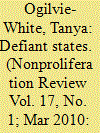

|
|
|
|
|
| Publication |
2010.
|
| Summary/Abstract |
This article explores the potential impact of U.S. disarmament leadership on the nuclear diplomacy of North Korea and Iran, the "defiant states." The first part of the article introduces the concept of "interaction capacity," which measures a state's integration into international society, based on its physical communication systems and its adoption of shared norms. The theory predicts that lower levels of interaction capacity will generate a greater propensity for nuclear defiance, as the affected states reject and try to resist integration pressures. In the second and third parts of the article, this conceptual framework is applied to the cases of North Korea and Iran. The analysis suggests that efforts to reassert U.S. disarmament leadership could increase the alienation of North Korea and Iran, leading to provocation and escalation of nuclear tensions. The final part of the paper explores the policy implications of this analysis for the potentially defunct six-party talks, for hopes of renewed negotiations with Iran, and for the 2010 Review Conference of the Treaty on the Non-Proliferation of Nuclear Weapons.
|
|
|
|
|
|
|
|
|
|
|
|
|
|
|
|
| 10 |
ID:
146627
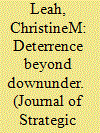

|
|
|
|
|
| Summary/Abstract |
From 1944 to 1973 Australia attempted to acquire atomic weaponry. This ambition was driven by the desire to contribute to defending British interests in Asia, fears of invasion by China, Indonesia, and Japan, great-power war, and the belief that nuclear weapons were merely bigger and better conventional weapons, that they would proliferate, and that US security assurances lacked credibility. Although the pursuit of the bomb was eventually abandoned, this was not the result of US assurances. Rather, geopolitical changes in Australia’s environment meant that a major attack on the continent was unlikely to occur outside the context of a confrontation between the US, China, and the Soviet Union. This article argues that Australia may soon have to rethink its policies towards US extended deterrence and instead focus on developing its own deterrent.
|
|
|
|
|
|
|
|
|
|
|
|
|
|
|
|
| 11 |
ID:
093557


|
|
|
|
|
| Publication |
2010.
|
| Summary/Abstract |
This special section examines the disarmament dynamics being generated by President Barack Obama and other world leaders in their advocacy of a nuclear-weapon-free world. It explores the responses of five groups of states (nuclear weapon states, threshold states, advocacy states, holdout states, and defiant states) to the new disarmament momentum, assessing whether a global consensus on-and concrete progress toward-nuclear elimination is likely. The main goals of this special section are: to generate scholarly debate on this important subject (the literature has tended to focus on understanding proliferation rather than disarmament dynamics); and to examine the potential consequences of reinvigorated disarmament leadership for the upcoming Review Conference of the Treaty on the Non-Proliferation of Nuclear Weapons, which will be held in New York City in May 2010.
|
|
|
|
|
|
|
|
|
|
|
|
|
|
|
|
| 12 |
ID:
066707
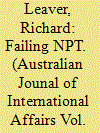

|
|
|
| 13 |
ID:
103438
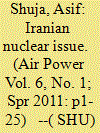

|
|
|
| 14 |
ID:
105206
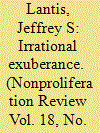

|
|
|
| 15 |
ID:
094119
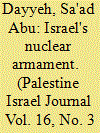

|
|
|
| 16 |
ID:
146625
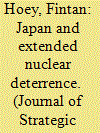

|
|
|
|
|
| Summary/Abstract |
To an observer, Japan’s approach to nuclear weapons can appear confused and contradictory. The only country to have been attacked with nuclear weapons is variously described as a pacifist and non-nuclear nation and as a proliferation threat. These widely varied and conflicting conclusions are understandable given that conflicting messages are sent by senior figures. However Japan’s stance is in fact a coherent, if not uncomplicated, response both to its security needs and to domestic public opinion. However, the security provided by US extended nuclear deterrence underlines and enables this approach. The key policies and decisions were taken in both Washington and Tokyo between China’s first nuclear test (1964) and Japan’s ratification of the Nuclear Non-Proliferation Treaty (1976). How the United States came to offer this additional security guarantee to Japan and how Japan came to rely upon it underscore this complex stance and are crucial to understanding a longstanding and ongoing security arrangement and source of stability and security in northeast Asia.
|
|
|
|
|
|
|
|
|
|
|
|
|
|
|
|
| 17 |
ID:
188614
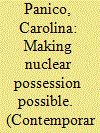

|
|
|
|
|
| Summary/Abstract |
This article interrogates the disarmament principle under Article VI of the NPT, drawing attention to how the disarmament discourse shapes and reproduces the nuclear status quo. Building on the work of Kimberly Hutchings and Maja Zehfuss, I argue that the disarmament discourse renders nuclear possession more acceptable. It enables nuclear states to present themselves as less violent and more responsible actors glossing over the nature of possessing nuclear weapons. Using a feminist poststructuralist lens and examining empirical illustrations, the article explains how declarations of strict observance of the disarmament principle reaffirm traits and values that underpin social expectations of what is considered ethical and appropriate in nuclear politics. Moreover, it shows how the rhetorical commitment to a world free of nuclear weapons reinstitutes and preserves existing understandings around nuclear responsibility that define the bounds of acceptable nuclear possession, perpetuating the dominant status quo.
|
|
|
|
|
|
|
|
|
|
|
|
|
|
|
|
| 18 |
ID:
006275
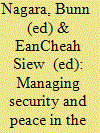

|
|
|
|
|
| Publication |
Kuala Lumpur, ISIS, 1996.
|
| Description |
viii, 594p.
|
| Standard Number |
9679472183
|
|
|
|
|
|
|
|
|
|
|
|
Copies: C:1/I:0,R:0,Q:0
Circulation
| Accession# | Call# | Current Location | Status | Policy | Location |
| 037960 | 355.03305/NAG 037960 | Main | On Shelf | General | |
|
|
|
|
| 19 |
ID:
055391
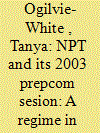

|
|
|
| 20 |
ID:
094128
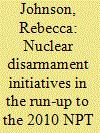

|
|
|